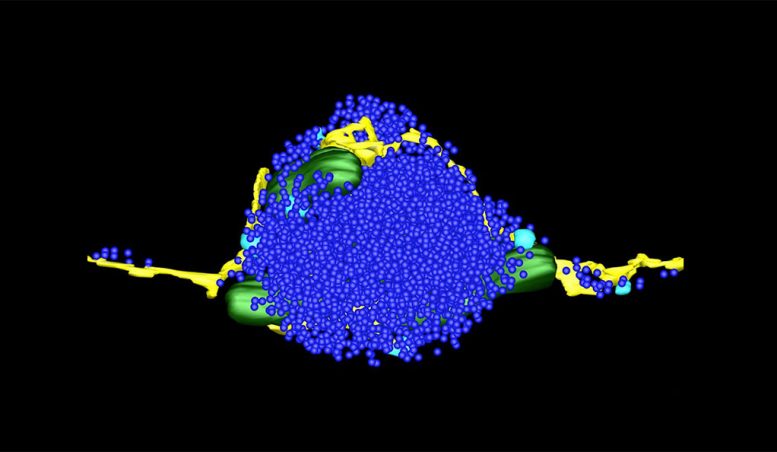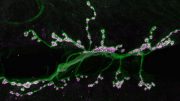
Synaptic vesicles (blue) that harbor chemical messengers form tight clusters within cells. (Image courtesy of Dr. Yumel Wu, Yale School of Medicine)
The nervous system depends upon the tightly regulated spatial and temporal communication that occurs between neurons at specialized connections called synapses. Chemical signals called neurotransmitters, the molecules responsible for communication between neurons, are packed into hundreds of membrane sacks known as synaptic vesicles. These vesicles form tight clusters at the nerve terminal. Despite being held together, vesicles are highly mobile within these clusters, so that they can be randomly recruited to the surface of the cell to release their content upon activation of the neuron.
In a new paper published July 5 in the journal Science, Yale researchers describe how this compact but highly mobile structure is achieved. They found that synaptic vesicles organize themselves into a liquid compartment within interior of the cell, much as oil does when mixed with water. The new research shows groups of synaptic vesicles can “demix” in the presence of a common nerve terminal protein synapsin, explaining how vesicles can both remain tightly clustered yet rapidly fuse with membrane of neurons when activated, said Yale’s Dragomir Milovanovic, lead author of the study and postdoctoral researcher in the lab of Pietro De Camilli.
Reference: “A liquid phase of synapsin and lipid vesicles” by Dragomir Milovanovic, Yumei Wu, Xin Bian and Pietro De Camilli, 5 July 2018, Science.
DOI: 10.1126/science.aat5671









Despite being held together, vesicles are highly mobile within these clusters, so that they can be randomly recruited to the surface of the cell to release their content upon activation of the neuron.